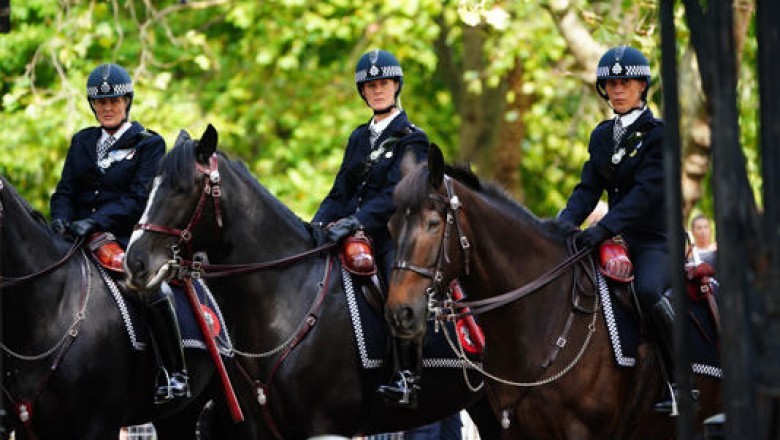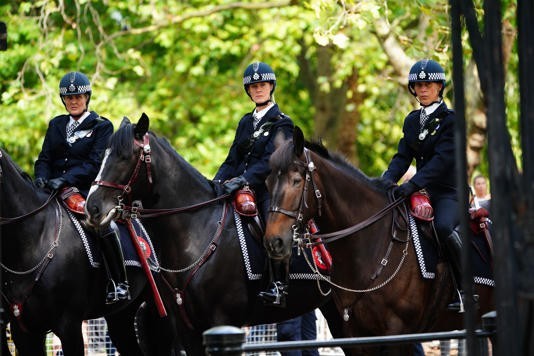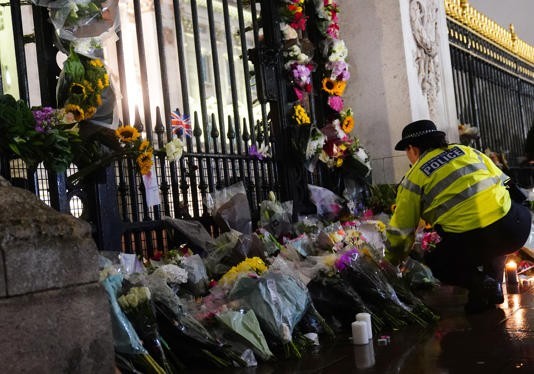
views

More than 30 arrests have been made so far as part of the biggest policing operation in the Met’s history in the lead-up to the Queen’s funeral.
Metropolitan Police Deputy Assistant Commissioner Stuart Cundy said by Friday morning 34 people had been arrested for a “range of offences” but described this as “relatively few”, adding that none had been for protesting.
Scotland Yard has not yet been able to provide a breakdown of the offences involved.
The senior officer told reporters the “hugely complex” policing operation is the biggest in the force’s history, surpassing the London 2012 Olympics which saw up to 10,000 police officers on duty per day.
Mr Cundy said: “This will be the largest single policing event that the Met Police has ever undertaken.

“As a single event this is larger than the 2012 Olympics, it is larger than the Platinum Jubilee weekend.
“The range of officers, police staff and all those supporting the operation is truly immense.”
It will also be the largest global protection operation the force has dealt with, as hundreds of world leaders, dignitaries and other VIPs are expected to attend the state funeral on Monday.
“There is absolutely nothing that can compare to the scale and complexity of our policing operation,” Mr Cundy later told the PA news agency.
Met Commissioner Sir Mark Rowley described the policing operation for the funeral as “enormous”, adding that his officers are being supported by “pretty much every force across the country” who are all “relishing the opportunity”.
He told PA: “The number of officers deployed is heading to a point where it will be well beyond the total size of a force like West Midlands or Greater Manchester – it will be heading into the high numbers of thousands of officers deployed.”
Mr Cundy said the police operation will be “significantly increasing” ahead of Monday.
In the wake of the Queen’s death, in mutual aid alone – officers who are drafted in from outside forces to help – there will be 20,000 officer shifts throughout the week and 2,000 officers in a single day at the peak, Mr Cundy said.

Specialist teams involved in the operation include motorbike escort riders, mounted branch carrying out patrols on horseback, firearms officers, dog teams and the marine unit.
The force has used more than 22 miles (36km) of barriers in central London alone to control crowds and keep key areas secure.
Mr Cundy did not say whether any plots to disrupt the ceremonial events had been foiled by police so far.
But when asked about media reports of a man found swimming in the Thames with a GoPro camera, Mr Cundy said the man had been spoken to by officers, dismissing this as “nothing more than a man that was going for a charity swim”.
His comments came after the MailOnline reported claims from sources that officers had foiled a suspected plot by an environmental activist after he was caught paddling on a float near the Houses of Parliament.
The Met said police became aware of a man in the river at around 3.25am on Monday who “appeared to be using a flotation device” and came out of the water at Victoria Tower Gardens.
He was not arrested but was “given words of advice about his proximity to a restricted area”, a force spokeswoman said.
Mr Cundy also stressed that police would only intervene in protests when “absolutely necessary”, as he insisted any action by officers would be “proportionate and balanced.”
A demonstration organised by the family of Chris Kaba – who was shot dead by a firearms officer – is due to take place on Saturday, starting in Parliament Square and then moving to Scotland Yard.
Meanwhile, drones are banned in central London where there is currently a “no fly zone” and 11 people have been spoken to by police for flying drones in the last week, Mr Cundy said.
He added: “They are primarily members of the public who are not aware and not considering really what they should be doing.”
Assistant Chief Constable Tim De Meyer, who is leading the Thames Valley Police operation, said more than 2,000 officers will be deployed in Windsor on Monday to make sure the Queen’s committal is “safe and dignified”.
He said the force has a “long and distinguished” record of policing royal events but this is the “largest and most significant” in its history.
Mr De Meyer said there will be “airport-style” security checks, including screening arches and bag checks, while there will also be vehicle barriers in place and armed patrols.
The force said it will also use drones to monitor the crowds, as well as carrying out river patrols and searching phone boxes, drains and bins among other areas.




















Comments
0 comment